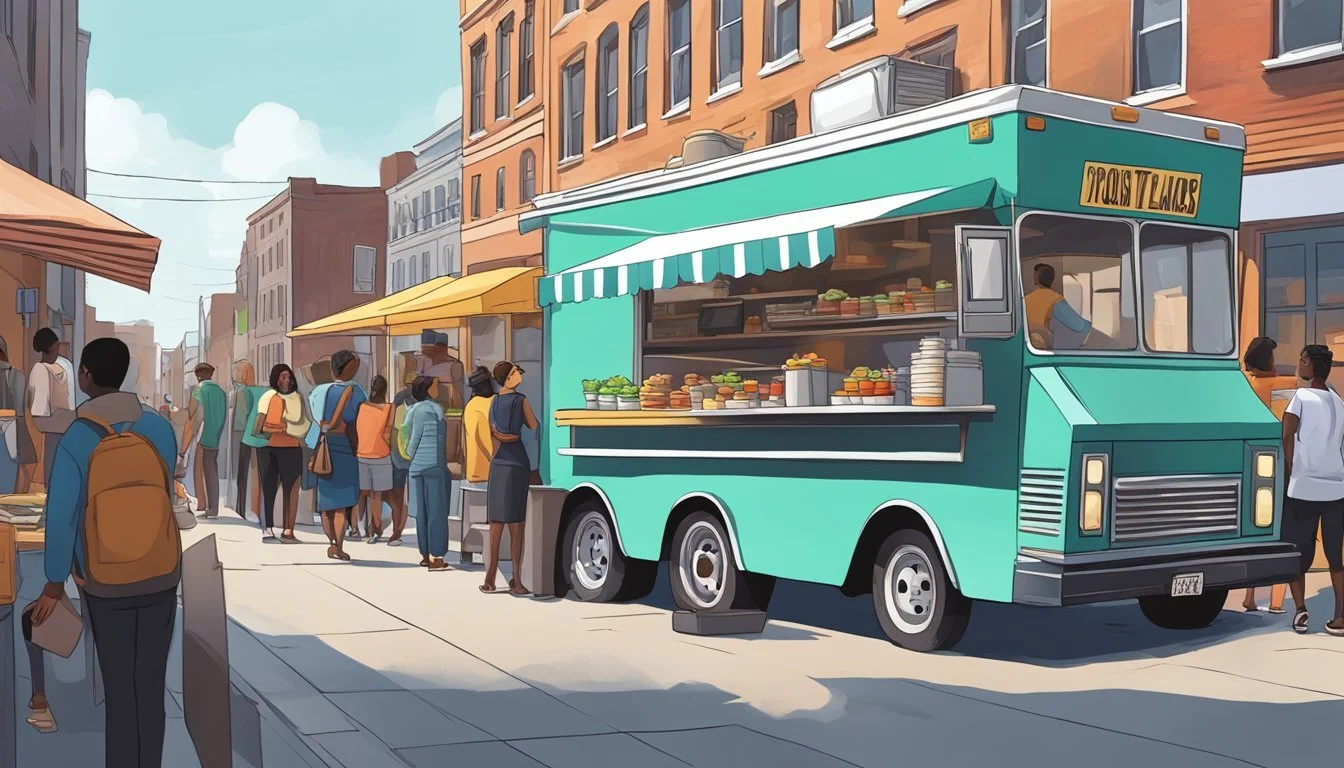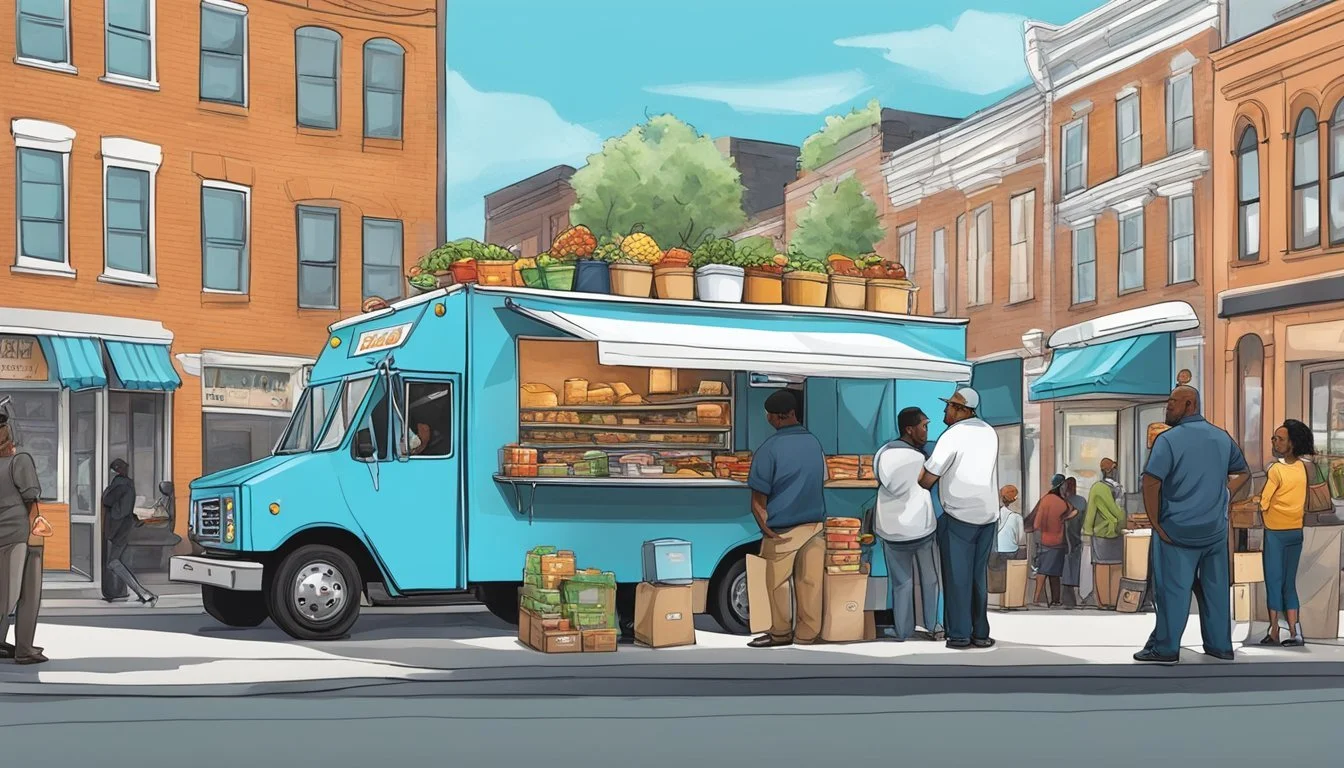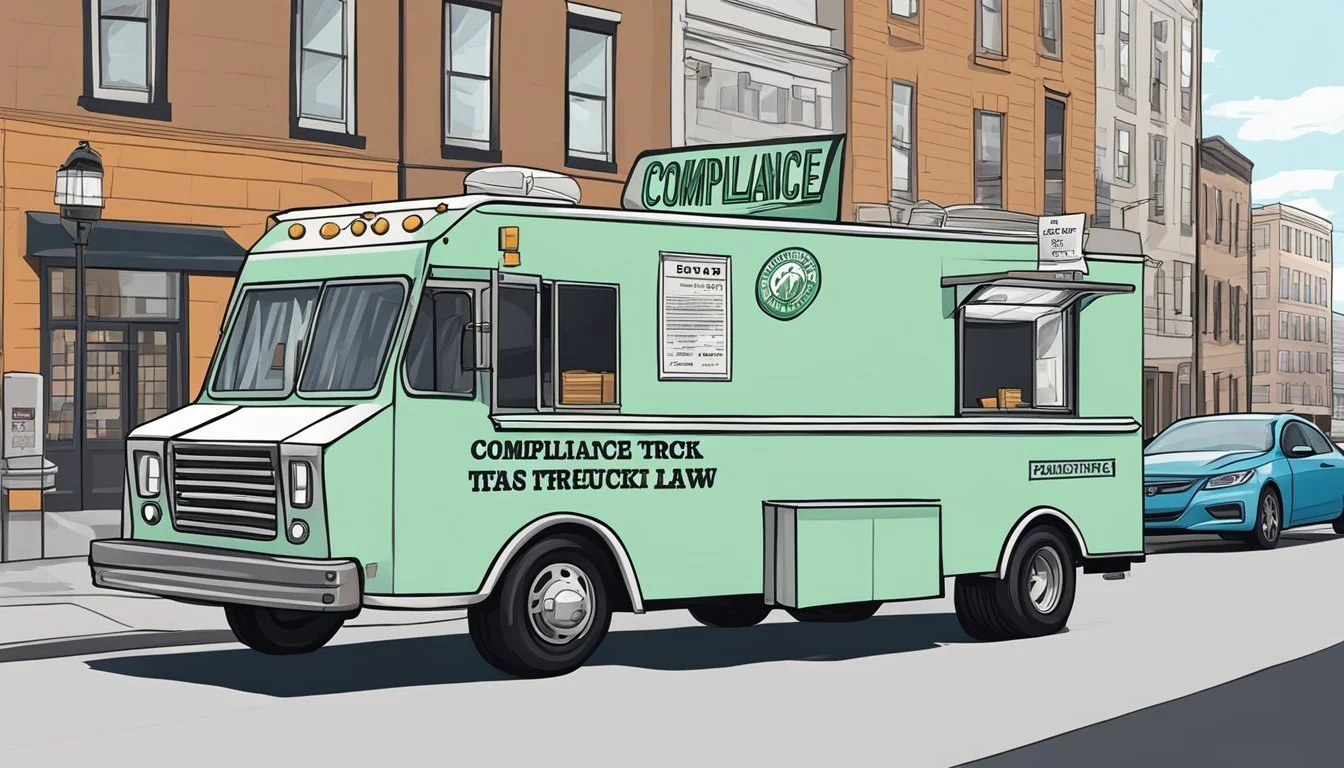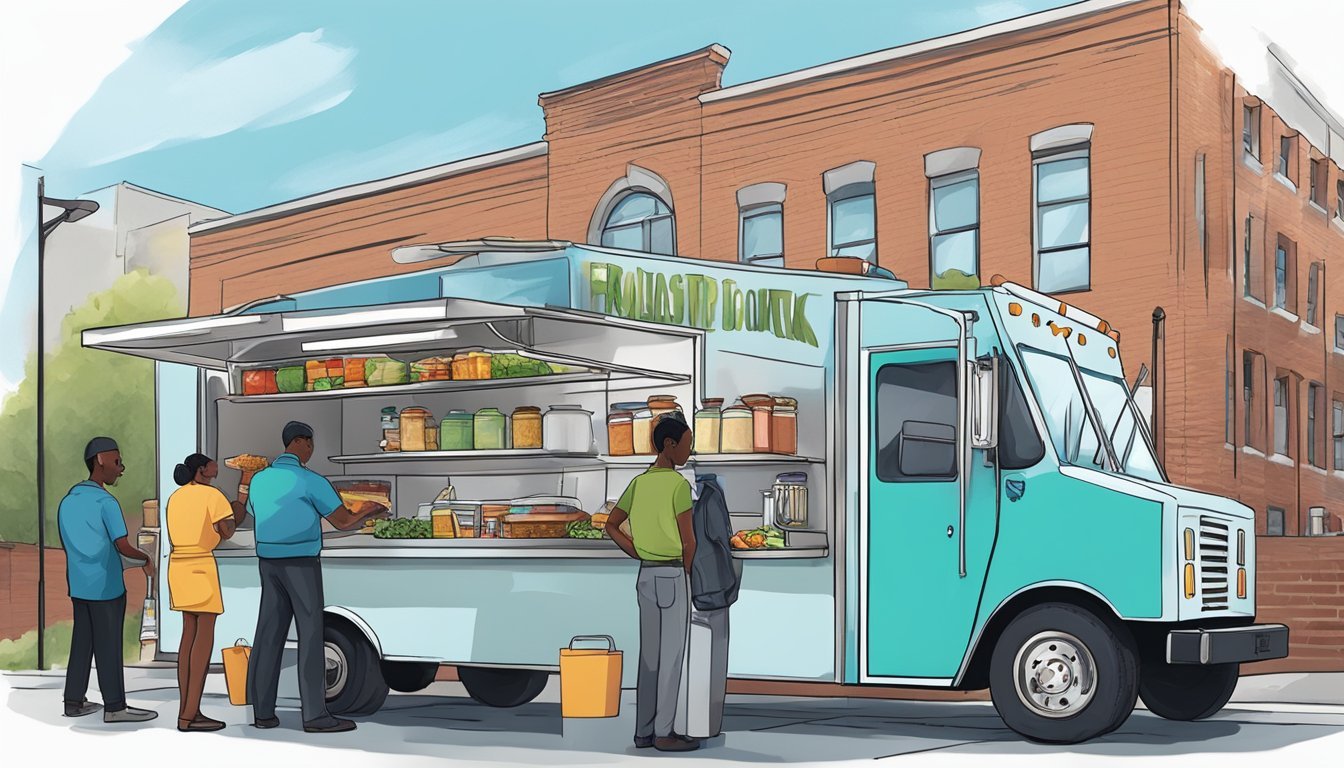Food Truck Laws Baltimore, Maryland
Your Comprehensive Guide to Compliance
Operating a food truck in Baltimore, Maryland, demands a keen understanding of the local regulations that govern street vending and mobile cuisine. The region's vibrant street food scene is supported by a framework designed to ensure public safety, food quality, and fair business practices. Entrepreneurs interested in bringing their culinary creations to the streets of Baltimore must navigate a series of legal requirements, including obtaining the appropriate food permits and licenses, which are necessary to commence and sustain their operations.
The Code of Baltimore County Regulations outlines specific guidelines for food service facilities and food trucks, detailing the processes for plan reviews and licensure. Furthermore, vendors must comply with food safety ordinances, local health laws, and various state and city regulations, which include everything from waste disposal to tax laws. Adhering to these regulations not only promotes a healthy environment for consumers but also lays a solid foundation for the success of food truck ventures in the city.
To legally vend on the streets, individuals must secure a license from Baltimore's Board of Licenses for Street Vendors. This encompasses a range of street vending setups, including motor vehicles, pushcarts, and bikes. Each setup may have its own unique set of regulations, as is the case with carts in stadium areas, which need to meet additional criteria. As the interest in mobile vending continues to rise, it is crucial for business owners to keep informed and compliant with the specific requirements and updates provided by Baltimore City's Department of Transportation.
Understanding the Food Truck Industry in Baltimore
The food truck industry in Baltimore presents unique opportunities and challenges, influenced by local regulations and community needs. This sector has increasingly become an integral part of Baltimore's culinary landscape.
Significance of Food Trucks in Maryland
Food trucks in Maryland provide crucial, flexible dining options for residents and visitors. They have become staples at local events, catering to the tastes of diverse communities. The presence of food trucks across Baltimore County is a reflection of the city's embrace of innovative and entrepreneurial food services. The growth of the industry attests to the popularity and demand for street food that can offer local and international flavors on-the-go.
Types of Mobile Food Vendors
Multiple types of mobile food vendors operate in Baltimore:
Traditional Food Trucks: These fully equipped vehicles serve a variety of food items and often have a specific culinary focus, ranging from gourmet sandwiches to ethnic cuisines.
Food Carts: Often found on sidewalks and public spaces, these smaller-scale vendors typically offer limited menus like hot dogs, pretzels, or coffee.
Mobile Food Kiosks: Semi-permanent fixtures in busy areas, kiosks serve quick snacks and drinks, aimed at on-the-go consumers.
Each type of mobile vendor adheres to Baltimore County regulations, which affects their operation and the variety of food they can serve. Obtaining the necessary permits and adhering to health codes are crucial steps for food truck owners to operate legally.
Starting a Food Truck Business
In Baltimore, Maryland, entrepreneurs must choose an appropriate business structure and acquire necessary identification numbers to establish a food truck business legally. These initial steps lay a foundation for compliance with state and local regulations.
Choosing a Business Entity
One of the first decisions for a food truck entrepreneur is determining the type of business entity they will establish. The most common structures include a Limited Liability Company (LLC) and sole proprietorship. An LLC offers personal liability protection and flexible tax options, making it a favorable choice for many business owners. Alternatively, a sole proprietorship is simpler to establish but does not provide the same level of liability protection as an LLC.
Obtaining an Employer Identification Number
An Employer Identification Number (EIN) is a federal tax identification number used to identify a business entity. It is essential, as it allows business owners to open a bank account, hire employees, and comply with tax requirements. The process to obtain an EIN is straightforward and can typically be completed online through the Internal Revenue Service website.
Legal Requirements and Food Truck Laws
In Baltimore, Maryland, food truck operators must navigate a complex landscape of legal requirements to ensure compliance. These laws are specifically designed to manage food safety, zoning, and operational standards within the region.
Baltimore's Food Truck Regulations
Baltimore County provides a robust framework for food truck operations. Operators are required to apply for a plans review for their proposed operation and obtain both a food permit and a food truck license as outlined in the Code of Baltimore County Regulations and Article 21, Title 8. The regulations ensure food trucks meet health and safety standards, from food handling to sanitary conditions. More details can be found regarding the process for Food Truck Operations - Baltimore County.
Maryland Food Truck Legislation
Statewide, Maryland's food truck legislation demands adherence to not only local health department permits but also food safety ordinances, OSHA regulations, and proper waste disposal methods. For instance, there are specific regulations about temperature control for food that are enforced to maintain public health. Tax laws and various public safety laws also apply. Relevant insights on these requirements are covered in the Food Handler's Guide.
Jurisdiction and Enforcement
The jurisdiction overseeing the enforcement of food truck laws in Baltimore falls to the Baltimore County Department of Permits, Approvals, and Inspections. This entity is responsible for issuing licenses and ensuring that food trucks comply with the required regulations. The local health department also plays a crucial role in the enforcement of food safety regulations. Specific guidelines for the operation and enforcement of food truck laws within Baltimore County can be found in the Baltimore County Food Truck Law.
Licensing and Permits
In Baltimore, Maryland, food truck operators must navigate a variety of licensing and permit requirements to legally serve food to the public. Compliance with these regulations is essential for food truck businesses, ensuring they meet health, safety, and operational standards.
Types of Licenses and Permits Required
Food trucks in Baltimore are subject to a range of licensing and permit requirements which include a Mobile Food Truck License, food service facility permits, and sometimes additional licenses such as a liquor license if they plan to sell alcoholic beverages.
Mobile Food Truck License: Mandatory for operation
Food Service License: Ensures compliance with health regulations
Business License: Legitimizes the truck as a legal business entity
A Liquor License: Required for trucks selling alcohol; obtained separately
Process for Acquiring a Food Truck License
To obtain a Food Truck License in Baltimore, one must:
Download and complete the application from the Baltimore County Department of Permits.
Pass a health department inspection to ensure food safety compliance.
Submit the application along with the requisite fee and any additional documentation as required by the county.
Additional Permits and Licenses
Depending on their specific operations and locations, food truck operators may need to secure additional permits and licenses:
Street and Mobile Vending Permit: For vending on city streets outside of designated food truck zones.
Special Event Permitting: For participation in festivals or community events.
Fire Safety Inspection Certificate: Mandatory for ensuring the truck's equipment meets fire safety standards.
Operators should consult the Baltimore City Department of Transportation for guidelines on street and mobile vending, as well as the specific rules and regulations that may apply to their food truck business.
Health and Safety Regulations
Ensuring compliance with health and safety regulations is crucial for food trucks operating in Baltimore, Maryland. These standards are in place to protect the public from health hazards and ensure that food service providers operate responsibly.
Food Safety Standards and Inspections
In Baltimore, food trucks must adhere to stringent food safety standards enforced by the Baltimore County Health Department. They perform regular inspections to verify compliance with local and state regulations. All food trucks are required to pass a plan review and health inspection prior to obtaining the necessary permits to operate.
Importance of Food Handlers License
A critical component of Baltimore's food safety initiative is ensuring that all food truck operators and employees obtain a Food Handlers License. This certification proves that individuals handling food are knowledgeable about safe food preparation, handling, and storage practices. It is mandated by the Maryland Department of Health to minimize foodborne illnesses.
Guidelines by the Department of Health
The Maryland Department of Health and Mental Hygiene establishes comprehensive guidelines for safe food truck operations. These requirements cover aspects such as proper waste disposal, food temperature control, and general food safety practices. Compliance with these guidelines is monitored through routine checks and serves as a baseline for all food truck vendors in Baltimore.
Vehicle Requirements
In Baltimore, Maryland, food trucks are subject to rigorous vehicle requirements to ensure public safety and compliance with health regulations. Adherence to these standards is enforced through mandatory inspections and equipment specifications.
Vehicle Inspection and Safety
Food trucks in Baltimore must pass vehicle inspection to verify that they are suitable for safe operation and public service. Inspectors check for overall mechanical compliance, mobility, and the structural integrity of the vehicle. The specific components under scrutiny include the tires, brakes, lighting systems, and the presence of necessary safety equipment such as first aid kits and properly rated fire extinguishers.
Fire Suppression Systems in Food Trucks
A critical aspect of food truck safety is the installation of effective fire suppression systems. These systems must be designed to handle the types of cooking appliances used inside the truck. Baltimore law requires that all food trucks be equipped with a fire suppression system that has been certified by a recognized testing laboratory. Regular maintenance and inspection of the fire suppression system are also necessary to ensure functionality in the event of a fire.
Taxation and Financial Considerations
In Baltimore, Maryland, food truck operators are required to navigate a landscape of specific tax regulations. Comprehension of these rules is essential for legal compliance and financial success.
Understanding Sales Tax for Food Trucks
Maryland's tax code mandates that sales of food are generally taxable. However, there is an exception for food sold by substantial grocery or market businesses where the food is intended for off-premises consumption and is not classified as taxable prepared food. For a business to be deemed substantial and qualify for this exception, grocery or market food item sales must constitute at least 10% of all sales. In the context of food trucks in Baltimore County, proprietors should be mindful that their sales are subject to Maryland's 6% state sales tax, with a local sales tax imposition of 2.5% on any taxable items they sell.
It is vital for food truck operators to apply the appropriate tax rates to their sales and maintain accurate records. Regular submission of collected sales taxes is also required to comply with state and local regulations. For specific guidance on compliance and to understand the nuances of what constitutes a taxable prepared meal, Baltimore County provides resources on the Food Truck Operations and sales tax obligations.
Compliance and Penalties
In Baltimore, Maryland, food truck operators must adhere to strict regulations and obtain the necessary permits to avoid significant consequences, including financial penalties. Ensuring compliance is not only a legal mandate but also a vital aspect of maintaining the legitimacy and reputation of a food truck business.
Consequences of Operating Without a Permit
When a food truck operates without a permit in Baltimore, the city authorities may impose hefty fines and, in severe cases, may impound the vehicle. This violation is considered a serious offense and can lead to interruption in business operations, limiting one's ability to generate income. Proper food truck licensing is mandatory and compliance with Article 21, Title 8.—Food Trucks is strictly enforced.
Dealing with Fines and Violations
In situations where violations have occurred, food truck operators are expected to address fines and violations promptly. Non-compliance may lead to increased penalties, and persistent disregard for regulations could result in the revocation of one's food truck license. It's crucial to follow the guidelines such as those set forth by the Baltimore City Department of Transportation to mitigate the risks and costs associated with penalties.
Local Health Department Relations
In Baltimore, Maryland, the relationship between food truck operators and the local health department is governed by well-defined regulations. The Baltimore County Health Department sets forth specific requirements to ensure food safety and public health. It is crucial for food truck vendors to understand and abide by these regulations to maintain a good standing with local authorities.
Registration and Inspections
Food truck operators must register their mobile food service facilities with the local health department. This involves submitting detailed forms that describe the nature of the food service, the types of foods served, and the facilities used for food preparation, handling, and storage. Routine inspections are conducted to ensure compliance with the Code of Baltimore County Regulations. These inspections cover a variety of aspects, including food temperature control, cleanliness, and employee hygiene.
Training and Certification
The local health departments mandate that food truck operators and staff complete a food safety training program. Staff members must obtain food handler certifications, demonstrating their knowledge in maintaining food safety standards.
Mobile Food Service Permit: Required for legal operation
Health Inspection: Conducted periodically by authorities
Food Safety Certification: Must be obtained by all food handlers
Communication and Complaints
Open communication channels exist between food truck vendors and local health departments. These facilitate the reporting of health-related incidents or lodging complaints. Food truck operators must report any foodborne illnesses or contamination promptly.
Adherence to these regulations helps create a sustainable environment for food service operations. By fostering a positive relationship with the local health department, food truck vendors in Baltimore ensure their businesses thrive while protecting public health.








